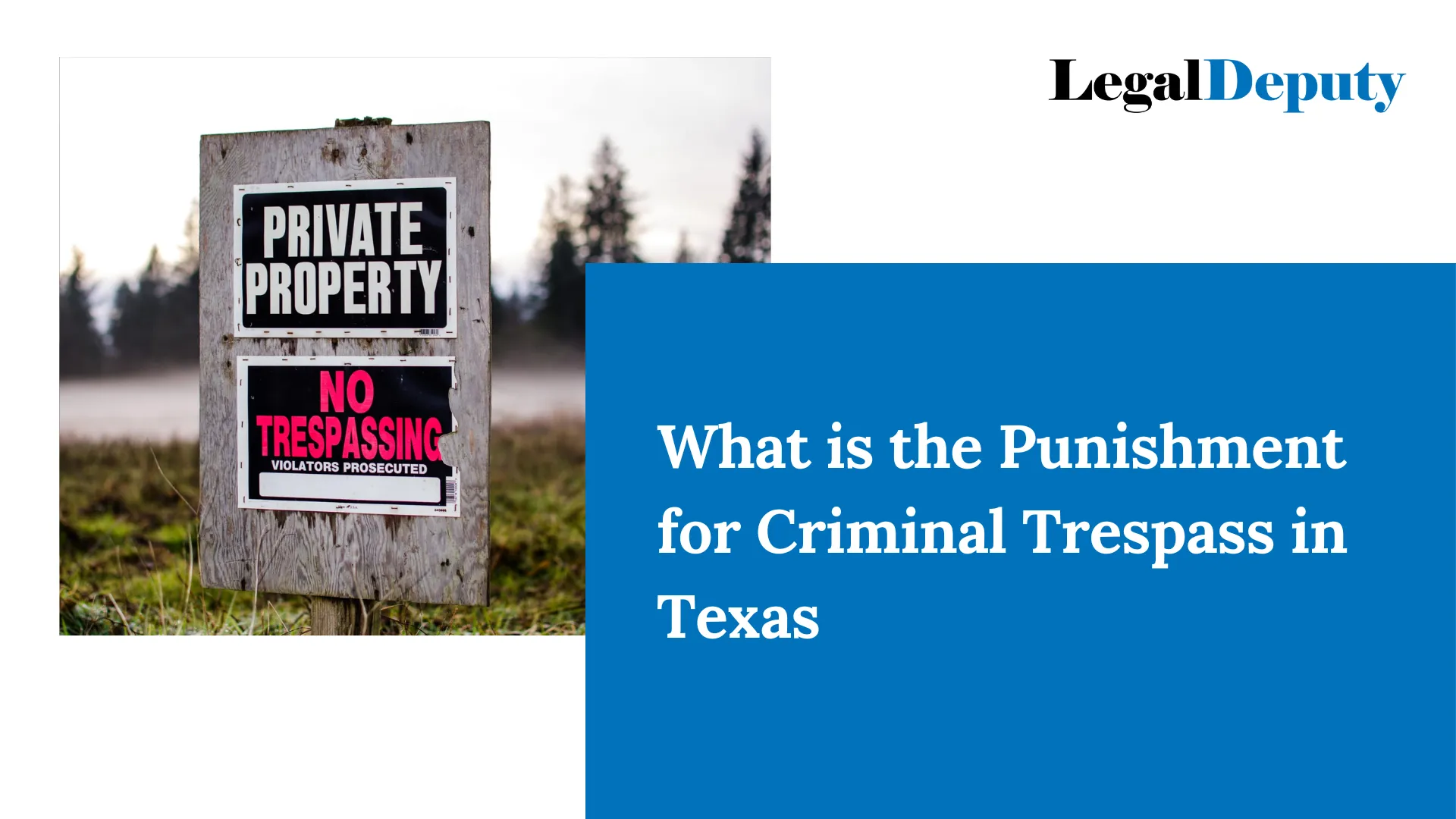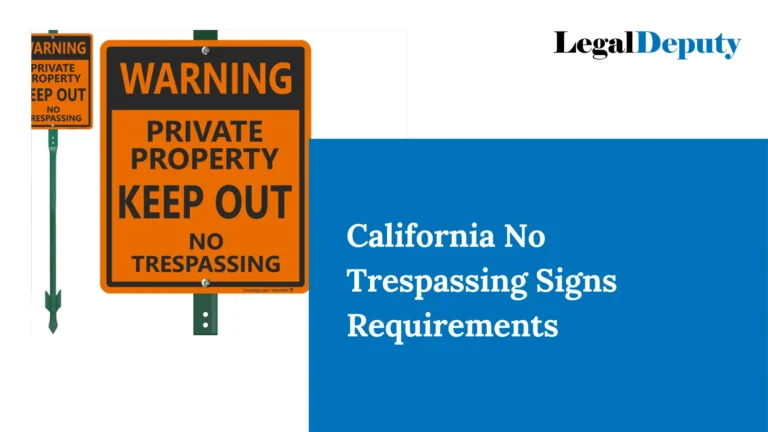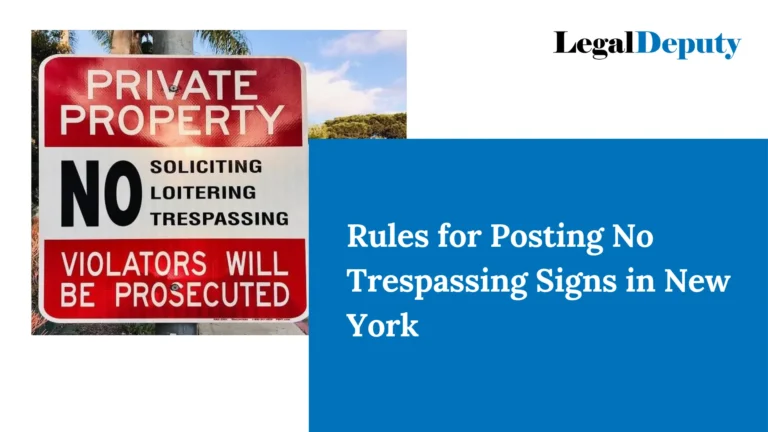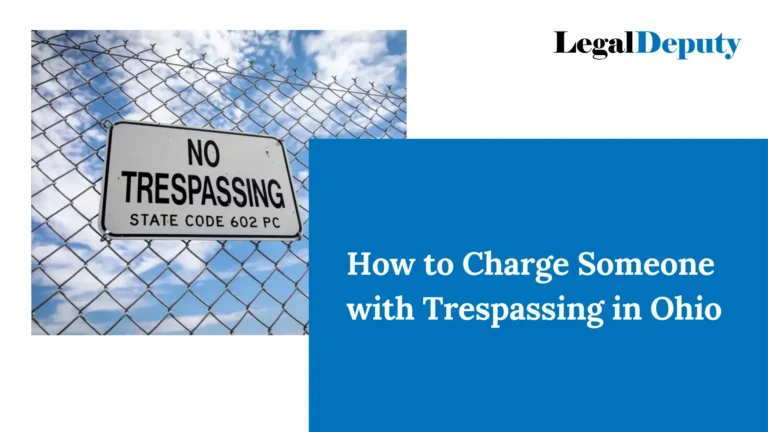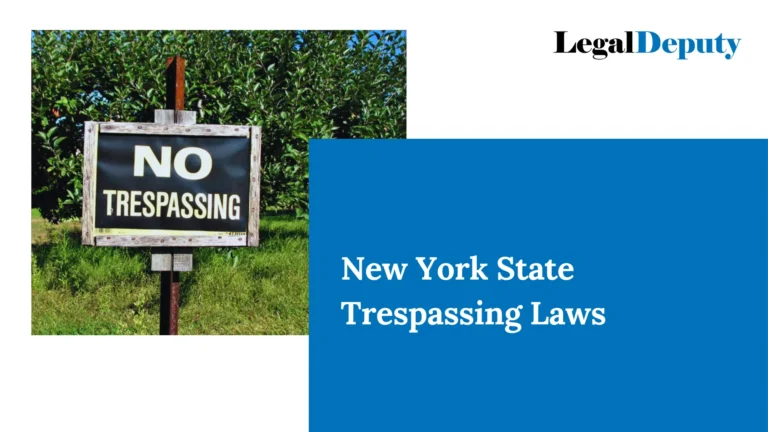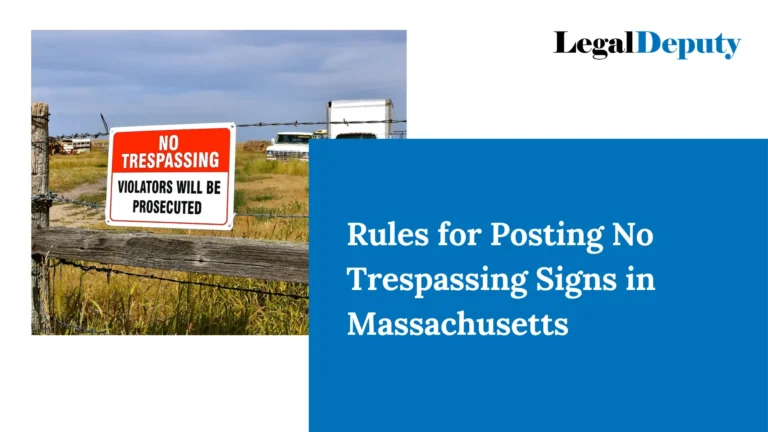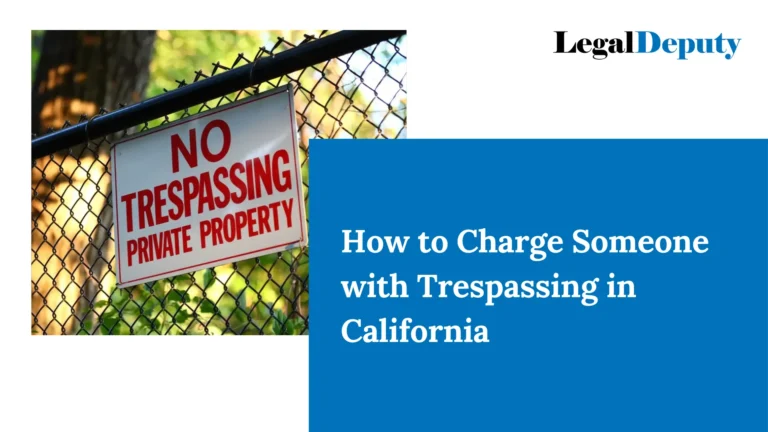What is the Punishment for Criminal Trespass in Texas? – All You Need To Know
Embarking on a journey through the intricacies of Texas law, it’s crucial to navigate the landscape of criminal trespass with a keen understanding of its consequences. Whether you’re a concerned citizen, a property owner, or someone who unexpectedly finds themselves on the wrong side of the law, comprehending the legal ramifications is paramount. Criminal trespass isn’t just a legal term; it’s a real-world scenario with tangible repercussions.
In the heart of the Lone Star State, where the rules are as vast as the Texas sky, this blog post aims to demystify the punishment for criminal trespass, offering insight into the legal process and emphasizing the importance of seeking professional guidance.
So, fasten your seatbelt as we embark on a journey to unravel the complexities of criminal trespass law in Texas—knowledge that may well prove to be your compass in the face of legal challenges.
Definition of Criminal Trespass in Texas
Navigating the legal landscape of Texas, it’s crucial to comprehend what constitutes criminal trespass. In the Lone Star State, criminal trespass occurs when an individual unlawfully enters or remains on another person’s property without permission. This can include anything from stepping onto someone’s land without consent to lingering in a building or dwelling without the owner’s authorization.
Understanding Degrees of Trespass:
Texas law recognizes different degrees or categories of criminal trespass, each carrying its own set of consequences. The severity of the offense often depends on factors such as intent, the type of property involved, and whether any aggravating circumstances are present.
Exploring Intent and Unauthorized Entry:
To be charged with criminal trespass, the prosecution typically needs to establish that the accused had the intent to enter the property without permission. Whether the entry was intentional or the result of negligence can significantly impact the degree of the offense. It’s essential to note that even if someone entered a property with permission but overstays their welcome, they may still be charged with criminal trespass if the property owner revokes consent.
Example Scenarios:
Imagine finding yourself exploring what appears to be an abandoned property or unknowingly wandering onto someone else’s land during a hiking expedition. While these scenarios may seem innocuous, they could lead to criminal trespass charges if proper authorization is lacking.
Why It Matters:
Understanding the legal definition of criminal trespass is not just about deciphering jargon; it’s about recognizing the potential consequences of your actions. Whether you are a property owner protecting your land or an individual unknowingly crossing boundaries, a solid grasp of these definitions is your first line of defense in navigating the legal complexities of Texas trespass law.
As we delve deeper, we’ll explore the degrees of trespass and the specific penalties associated with each, shedding light on the potential impact on your life. So, let’s unravel the layers and understand the nuances of criminal trespass in the state where everything is bigger, including the legal intricacies.
Elements of Criminal Trespass
Now that we’ve defined what criminal trespass entails in Texas, let’s delve into the fundamental elements that constitute this legal offense. Understanding these key components is crucial for anyone seeking to navigate the complexities of trespass law in the Lone Star State.
1. Unauthorized Entry:
At the core of a criminal trespass charge is the concept of unauthorized entry. This means entering a property without the explicit permission of the owner or occupant. It’s important to recognize that this element hinges on the lack of consent, and even a well-intentioned entry can lead to legal consequences if permission is not obtained.
2. Intent:
Establishing intent is a critical element in a criminal trespass case. The prosecution must demonstrate that the accused had the intention to enter the property without permission. This element helps differentiate accidental entries from deliberate acts of trespassing.
3. Presence on the Property:
Simply being present on someone else’s property without authorization is a key aspect of criminal trespass. This can include remaining on the premises after being explicitly asked to leave or entering a prohibited area within the property.
4. Notice or Warning:
Property owners often play a role in preventing trespass by posting signs, erecting fences, or issuing verbal warnings. The presence of such notices can impact the legal consequences for trespassers, as it establishes that they were aware of the restricted access.
Example Scenario:
Imagine a scenario where someone unintentionally wanders onto private property while exploring a scenic area. Although their entry may be accidental, the absence of permission and the lack of awareness regarding property boundaries can still result in a criminal trespass charge.
Real-World Implications:
Understanding these elements isn’t just about legal technicalities; it’s about recognizing the real-world implications of your actions. Whether you’re a property owner protecting your privacy or an individual inadvertently crossing boundaries, being aware of these elements is essential.
As we move forward, we’ll explore the degrees of criminal trespass in Texas and the specific penalties associated with each, shedding light on the potential impact on your life. So, let’s unravel the intricacies and gain a comprehensive understanding of the elements that shape criminal trespass law in the vast expanse of Texas.
Degrees of Criminal Trespass in Texas
In the legal landscape of Texas, not all trespass offenses are treated equally. The severity of a criminal trespass charge is classified into different degrees, each carrying distinct consequences. Understanding these degrees is essential to grasp the potential impact on your life or the life of someone you know.
1. Class B Misdemeanor:
The least severe degree of criminal trespass in Texas is classified as a Class B Misdemeanor. This typically involves entering a property without permission, which is a relatively minor offense. However, even a Class B Misdemeanor can result in significant consequences, including fines and potential jail time.
2. Class A Misdemeanor:
Stepping up in severity, a Class A Misdemeanor applies when a person enters a property with prior knowledge that their presence is forbidden. This could involve ignoring warnings or intentionally trespassing despite being aware of the restricted access.
3. Criminal Trespass with a Deadly Weapon:
Elevating the seriousness of the offense, criminal trespass with a deadly weapon involves entering someone’s property unlawfully while carrying a weapon. The presence of a weapon significantly escalates the potential consequences, emphasizing the importance of responsible and lawful behavior.
4. Aggravated Criminal Trespass:
In certain situations, aggravating factors can escalate a trespass offense to the level of aggravated criminal trespass. This may include trespassing on critical infrastructure or entering a property with the intent to commit a felony, intensifying the legal ramifications.
Example Scenario:
Picture an individual unknowingly entering a property marked with “No Trespassing” signs. While their initial intent may have been innocent, the degree of the offense can be influenced by factors such as prior warnings, the presence of a weapon, or the nature of the property.
Real-World Impact:
Understanding the degrees of criminal trespass goes beyond legal distinctions; it underscores the real-world impact on individuals’ lives. A seemingly minor act of trespassing can quickly escalate, leading to serious legal consequences. As we progress, we’ll explore the specific penalties associated with each degree, shedding light on the potential repercussions. So, let’s journey further into the Texas legal terrain, where degrees matter, and the consequences are as vast as the state itself.
Punishments for Criminal Trespass
Understanding the degrees of criminal trespass is incomplete without delving into the consequential aspect—punishments. In Texas, the penalties for trespassing vary based on the severity of the offense. Let’s explore the potential ramifications individuals may face when entangled in the legal web of criminal trespass.
1. Class B Misdemeanor Punishments:
For a Class B Misdemeanor, the least severe degree of criminal trespass, individuals may find themselves grappling with fines of up to $2,000 and a potential jail sentence of up to 180 days. What might initially seem like a minor transgression can result in significant legal repercussions.
2. Class A Misdemeanor Punishments:
Stepping into a Class A Misdemeanor escalates the stakes. Trespassing with knowledge of forbidden entry can lead to fines of up to $4,000 and a jail term of up to one year. The gravity of the offense becomes more apparent, emphasizing the need for responsible conduct.
3. Criminal Trespass with a Deadly Weapon Punishments:
When a deadly weapon is involved, the consequences become even more severe. Individuals may face fines reaching $10,000, and the jail term can extend to two years. The presence of a weapon adds a layer of complexity to the legal landscape.
4. Aggravated Criminal Trespass Punishments:
In cases of aggravated criminal trespass, where aggravating factors intensify the offense, individuals may confront fines of up to $10,000 and a potential prison sentence of up to two years. The severity of the penalties underscores the critical need for legal awareness.
Example Scenario:
Imagine an individual, initially unaware of the property boundaries, now facing the aftermath of a trespass charge. The fines and potential jail time associated with their actions may serve as a stark reminder of the impact even a seemingly minor offense can have on their life.
Real-World Repercussions:
Understanding the punishments for criminal trespass isn’t just about legalities; it’s about recognizing the real-world repercussions that individuals may endure. From financial strain to potential incarceration, the consequences underscore the importance of responsible and lawful behavior.
As we proceed, we’ll delve into possible defenses and the legal process, providing a roadmap for those seeking guidance in the face of criminal trespass charges. So, let’s navigate the terrain of consequences, where awareness can be the key to steering clear of legal pitfalls.
Possible Defenses
Navigating the legal terrain of criminal trespass in Texas may seem daunting, but individuals facing such charges have options for mounting a defense. Understanding these potential defenses is crucial, as they can play a pivotal role in mitigating the consequences associated with trespassing allegations.
1. Lack of Intent:
One effective defense against criminal trespass charges is demonstrating a lack of intent. If it can be established that the accused entered the property unintentionally or without awareness of the restricted access, it may serve as a compelling argument in their defense.
2. Express or Implied Consent:
If the accused had express or implied consent to enter the property, they may have a valid defense. This can include situations where the property owner gave permission, either verbally or in writing, or situations where the circumstances implied consent.
3. Legal Authority:
Individuals entering a property based on legal authority, such as law enforcement officers carrying out their duties, may have a strong defense. It’s crucial to establish that the entry was lawful and aligned with the individual’s role or responsibilities.
4. Inadequate Notice:
Property owners often deter trespassing by posting signs, erecting fences, or issuing warnings. If the accused can demonstrate that there was inadequate notice or unclear signage, it may form the basis for a defense.
Example Scenario:
Consider an individual who entered a property believing they had permission due to a misunderstanding. If they can prove their lack of intent to trespass and show any communication or circumstances that implied consent, it becomes a compelling defense against the charges.
Real-World Impact:
The defenses outlined here aren’t merely legal strategies; they represent the real-world implications for individuals seeking to protect their rights. Whether it’s proving lack of intent, establishing consent, or demonstrating legal authority, a robust defense can make a significant difference in the outcome of a criminal trespass case.
Legal Guidance Matters:
Navigating the nuances of these defenses requires a deep understanding of Texas trespass laws. Seeking legal guidance from professionals well-versed in criminal defense is crucial. As we progress, we’ll delve into the legal process and possible outcomes, providing a comprehensive guide for those facing criminal trespass charges. So, let’s empower ourselves with knowledge and explore the avenues available when defenses become the shield against legal challenges.
Legal Process and Possible Outcomes
Facing a criminal trespass charge in Texas initiates a legal process that can be complex and unfamiliar. Understanding this process and the potential outcomes is vital for individuals navigating the challenges of a trespass case. Let’s explore what to expect and the possible paths that may unfold.
1. Arrest and Booking:
The legal journey typically begins with an arrest if law enforcement believes there’s sufficient evidence of criminal trespass. The accused is then booked, and details of the alleged offense are recorded. It’s crucial to remain calm and cooperative during this stage.
2. Arraignment and Charges:
Following arrest, the accused is informed of the charges during an arraignment. This is an opportunity to enter a plea—guilty, not guilty, or no contest. Seeking legal counsel at this stage is highly recommended to make informed decisions.
3. Legal Representation:
Engaging the services of a skilled attorney can significantly impact the trajectory of a trespass case. A defense attorney can assess the evidence, explore possible defenses, and guide the accused through the legal process.
4. Negotiations and Plea Bargains:
In some cases, negotiations between the prosecution and defense may lead to a plea bargain. This involves the accused pleading guilty to a lesser charge in exchange for a more lenient sentence. The decision to accept a plea bargain requires careful consideration.
5. Trial and Defense:
If an agreement is not reached, the case may proceed to trial. Here, the defense presents evidence, challenges the prosecution’s case, and works to establish reasonable doubt. A thorough understanding of the legal process is crucial during this stage.
Possible Outcomes:
Acquittal: A favorable outcome where the accused is found not guilty, absolving them of the charges.
Conviction: If the prosecution proves guilt beyond a reasonable doubt, the accused may be convicted, leading to penalties.
Probation: In some cases, especially for first-time offenders, probation may be offered as an alternative to incarceration.
Fines and Restitution: Monetary penalties and restitution to the property owner may be imposed as part of the sentence.
Community Service: As part of the sentence, the court may order community service, allowing the accused to contribute positively to the community.
Example Scenario:
Consider an individual who, with legal representation, successfully challenges the evidence presented during trial, resulting in an acquittal. This outcome highlights the importance of a robust defense strategy.
Real-World Guidance:
Navigating the legal process and potential outcomes demands guidance from professionals experienced in criminal defense. Understanding the possible paths, from negotiations to trial, empowers individuals to make informed decisions.
As we progress, we’ll emphasize the importance of seeking legal help and provide insights into the nuances of the legal system. So, let’s equip ourselves with knowledge as we journey through the legal landscape, where outcomes are shaped by understanding and strategic decision-making.
Importance of Seeking Legal Help
In the intricate realm of criminal trespass charges in Texas, the importance of seeking legal help cannot be overstated. Navigating the legal system, understanding defenses, and striving for the best possible outcome requires the expertise of seasoned professionals. Let’s delve into why securing legal assistance is not just a choice but a critical necessity.
1. Understanding the Complexity:
The legal process surrounding criminal trespass charges can be complex, involving nuances that may be challenging for individuals to navigate on their own. Attorneys specialized in criminal defense bring a deep understanding of the law, ensuring that every aspect of the case is meticulously examined.
2. Customized Defense Strategies:
Each trespass case is unique, and a one-size-fits-all approach seldom applies. Legal professionals can tailor defense strategies based on the specific circumstances of the case, whether it involves challenging evidence, establishing lack of intent, or negotiating favorable terms.
3. Knowledge of Local Laws:
Legal nuances can vary from one jurisdiction to another, and understanding the specific intricacies of Texas trespass laws is crucial. Local attorneys bring a wealth of knowledge about the legal landscape, judges, and procedures, offering a distinct advantage in building a robust defense.
4. Mitigating Consequences:
Experienced attorneys can often negotiate with the prosecution to minimize the potential consequences of a criminal trespass charge. This may involve seeking reduced charges, exploring plea bargains, or advocating for alternative sentencing options such as probation or community service.
5. Emotional Support and Guidance:
Legal battles can be emotionally taxing, and having a supportive attorney by your side provides not only legal guidance but also emotional support. Navigating the uncertainties of the legal process becomes more manageable with a dedicated advocate working on your behalf.
Example Scenario:
Imagine an individual charged with criminal trespass, unsure of their rights and potential defenses. With legal representation, they gain a sense of clarity, confidence, and assurance that their case is being handled by professionals dedicated to protecting their interests.
Real-World Impact:
The importance of seeking legal help extends beyond the courtroom; it influences the trajectory of an individual’s life. From the potential reduction of penalties to the emotional reassurance during a challenging time, legal assistance plays a pivotal role in shaping outcomes.
Take Action, Secure Help:
In the face of criminal trespass charges, taking prompt action to secure legal help is a proactive step toward a more favorable resolution. As we conclude this exploration of the legal aspects surrounding trespass, remember that legal professionals are not just advocates; they are partners in guiding you through the legal complexities, where knowledge and experience make a difference.
So, let’s empower ourselves by seeking the support we need and making informed decisions on the journey through the Texas legal landscape.
Conclusion
As we conclude this exploration into the consequences of criminal trespass in the Lone Star State, it’s evident that awareness is the compass guiding us through legal complexities. Whether you’re a property owner safeguarding your space or an individual unwittingly facing charges, understanding the severity of degrees and potential punishments is paramount.
Remember, the legal process can be challenging, but seeking professional guidance can make all the difference. From crafting personalized defense strategies to negotiating with the prosecution, legal experts are your allies in this journey. The real-world impact of criminal trespass charges goes beyond fines and sentences; it influences lives.
In the vast expanse of Texas law, the importance of seeking legal help cannot be overstated. As you navigate through the legal landscape, empower yourself with knowledge, secure support, and make informed decisions. Let this be a reminder that, in the face of legal challenges, you are not alone. The journey ahead may be uncertain, but with the right guidance, you can navigate it successfully, ensuring a brighter, more secure tomorrow.
Disclaimer
The information provided on this blog is for general informational purposes only and should not be construed as legal advice. While we strive to keep the information accurate and up-to-date, laws and legal interpretations may change, and individual circumstances vary.
Reading, accessing, or using the content on this blog does not establish an attorney-client relationship. Always seek the advice of a qualified legal professional regarding your specific situation. Reliance on any information provided here is solely at your own risk.
We do not endorse or guarantee the completeness, reliability, or accuracy of any third-party links, articles, or resources mentioned in this blog. The blog is not a substitute for professional legal advice, and readers should consult with an attorney for guidance tailored to their individual needs.
The views expressed by contributing authors are their own and do not necessarily reflect the views of this blog or its administrators. Any legal action taken based on the information presented here is the sole responsibility of the reader.
By accessing and using this blog, you acknowledge and agree to these terms. If you require legal advice, please consult a qualified attorney.

